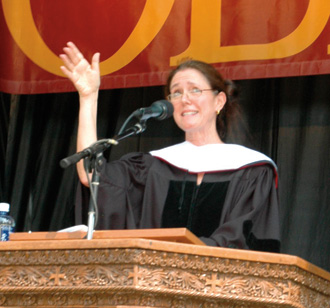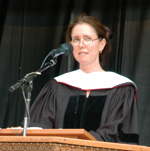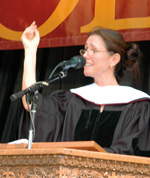Oberlin Alumni Magazine
Summer-Fall 2010 Vol. 105 No. 4
Q&A: Julie Taymor
 (photo by GradTrak)
(photo by GradTrak)
Julie Taymor ’74, director of films (Across the Universe, Frida, Titus), theater (The Lion King: The Musical) and opera (The Magic Flute, currently being performed as part of the repertoire of the Metropolitan Opera), is not intimidated by icons. She’s worked with Disney, the music of the Beatles, and, coming soon to Broadway, comic book superhero Spiderman. On the other hand, she said she was "traumatized" by the assignment of delivering the 2010 commencement address at her alma mater. The one thing she knew was that she wasn’t going to instruct the new graduates about their social responsibility. "It’s Oberlin, and they should know that," she says. "You don’t really need me to come here and tell them they have to take care of the world."
Following a commencement-eve tour of the Apollo Theatre, in between phone calls from U2’s Bono (a musical collaborator on Spiderman), she sat down with the editor of the Oberlin Alumni Magazine, Jeff Hagan ’86, to answer a few questions.
OAM: You have done projects on a very small scale, and on a very, very large scale. How does that come about? Is it just a question of fitting your work style?
Taymor: Projects come to me, and their scale is really not important. It’s whether it’s meaningful to me to do. It’s whether I get turned on, excited, enthusiastic about the idea. And then it will tell me whether it’s large scale or not large scale. I don’t think there’s more value in one or the other—at all.

(photo by GradTrak)
My Shakespeare film [The Tempest, due out this year] has 12 people in it. Across the Universe had 5,000 extras, 150 scenes—a very big budget movie for me. It needed to be because it was the Beatles, you know? It was an expansive story, and an expansive time. You needed to show the Vietnam War, you needed to show the protests, you needed to get into the psychedelic.
(But) the way that I think of a visual effect is that it still has to be very tactile, very visceral, very handmade and funky. So I’m not going to change my style just because I have more money.
OAM: You’ve put at risk millions of dollars of other people’s money. How do you get the confidence to do that?
Taymor: If I believe in it, which I have to, and then if my collaborators believe in it, then I believe that we can take that risk. And that’s a big part of what I want to talk about (in my commencement speech): There’s just no point in doing anything if it’s not dangerous, if it doesn’t have risks, because you can’t break ground or do something new or take people to a place they’ve never been before, give them something they didn’t know they even wanted.

(photo by GradTrak)
OAM: Do you think of the Beatles and Disney as folkloric?
Taymor: I think Disney clearly has always dealt with fables, fairytales, myths, and folklore. When I was asked to do Lion King, I was really anti-Disney because aesthetically it was so unappealing to me. But I did know that the material was in the same playground, the material was similar [to my other work]. They didn’t shy away from death. The death of a father for a 4-year-old is a big deal.
But that’s what theater is supposed to do—it’s exactly what theater is supposed to do: give you an outside format in which you can discuss the major traumas and horrors of life and bring your kids through it. It’s an exorcism of sorts.
The distancing is what’s important in order for people to look at themselves. You sort of have to get outside of yourself to see yourself.
OAM: Was Oberlin important for you?
Taymor: When I went here, part of that time there were no grades and I made my own major. I think people scoff at that kind of freedom. But there are people who that freedom is absolutely appropriate for and I’m one of them. I put together my own major [mythology and folklore]. I took religion classes, English literature, there was a folklore and mythology class. I put it all in that heading. And every single thing that I studied—I realized almost all of my theater pieces, and my films, have somehow been connected with one of those things that I did here. Sometimes even more directly than you can imagine.
I never studied theater. Ever. To me, I was always a practictioner. If you’re going to be a theater artist or a film director, you really have to study everything else. And that’s what Oberlin was good for. It was a good jumping off point for me to take me into distant places, distant lands, all of that.
